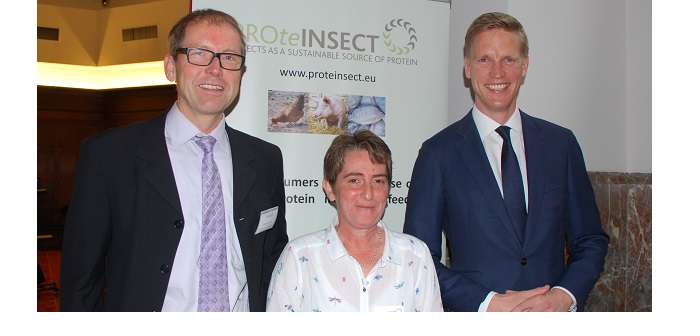The prospect of feeding pigs, poultry and fish on diets which include insect protein has been advanced by the release in Brussels today of positive feeding trials results for the three species.
According to the EC-funded PROteINSECT project, feeding trials with pigs have revealed “improved gut health” in piglets; trials with poultry have shown that chickens perform as well on insect protein as those fed on commercial diets, while fish feeding trials have demonstrated that insect meal can replace up to 50% of feed without affecting animal performance.
Based on these findings, PROteINSECT project leaders have called for a review of current insect protein legislation and for funding to help address Europe’s protein deficit.
The research findings are summarised in project White Paper titled Insect Protein – Feed for the Future: Addressing the need for feeds of the future today, covering issues relating to food safety, nutritional value, environmental impact, commercialisation and the challenge of consumer acceptance of including insect protein in animal feed.
The paper calls for two key actions from the EU:
- Review EU regulations 999/2001 and 1069/2009, which prohibit the use of insects as a source of protein for animal feed for animals raised for human consumption; and the rearing of insects on manure or catering waste, respectively.
- Make a commitment to undertake the necessary research to ensure that the required evidence is available for the European Food Safety Authority (EFSA) to carry out a full risk profile for insects reared on organic wastes, building on EFSA’s ‘Risk profile related to production and consumption of insects as food and feed’ published in October 2015).
Copies of the White Paper have already been distributed to key members of the European Parliament and were formally presented at PROteINSECT’s final conference taking place in Brussels today.
“The protein gap in Europe is a very real risk to social, economic and environmental progress,” said PROteINSECT project co-ordinator, Dr Elaine Fitches.
“As we seek sustainable European long term solutions we must consider the benefits that the introduction of insects – specifically fly larvae – could have on the content of animal feed.
“PROteINSECT believes these highly effective protein converters offer great potential for Europe to become global contributors to the provision of alternative and additional innovative protein sources.”
Headline image shows (l-r) Dr Wolfgang Trunk, European Commission. DG Sante; Dr Elaine Fitches, PROteINSECT project co-ordinator and Jan Huitema, MEP and member of European Parliament Aghriculture Committee, pictured at the Brussels conference today.


